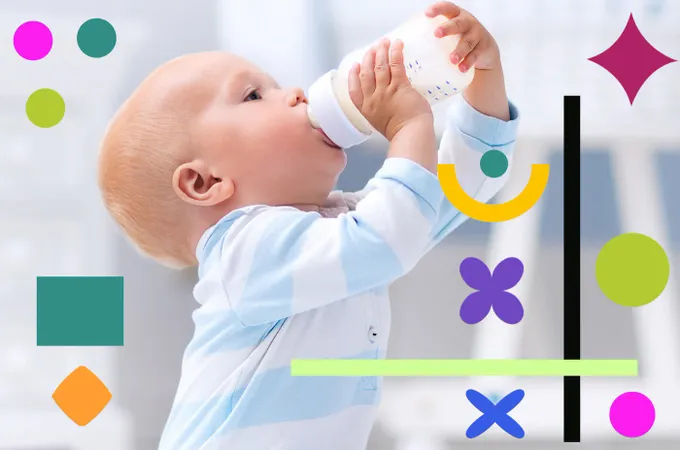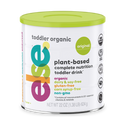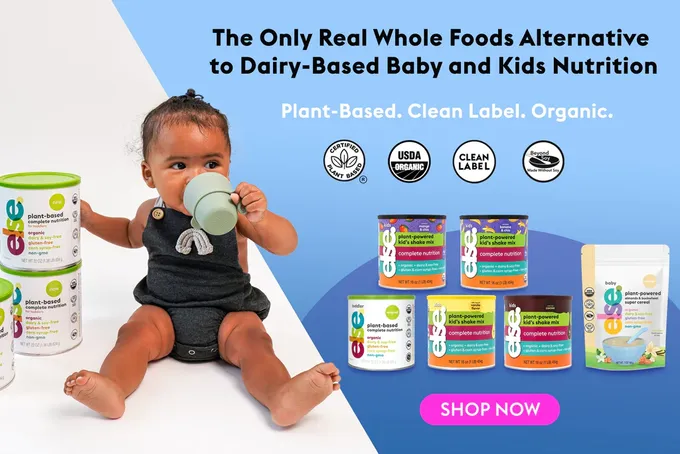Toddler Formula vs Infant Formula: Which to Choose?
Confused about whether to choose toddler formula or infant formula? This guide breaks down the differences, helping you make the best decision for your child's nutritional needs.
Updated September 30, 2024

When confronted with all those different items on the baby formula aisle, you might wonder what the difference is between toddler formula and infant formula.
In this case, the answer is straightforward: Toddler and infant formulas are not the same.
In this short guide, we’ll explain the difference between toddler formula vs. infant formula so that you can make the best choice for your growing baby.
Please note that toddler formula is designed for babies who are over 12 months old and should not be given to infants due to their different nutritional requirements.
Your Baby's Changing Nutritional Needs
What should you feed your baby? What seems to be a simple question has a complicated answer. The right answer depends on your family’s specific needs and your child’s developmental stage. First, we’ll review the typical stages between a newborn and a toddler’s transition to a solid food diet.
- From birth to six months, the best option to feed babies is breast milk; if not feasible, infant formula is the only acceptable alternative. That is a special time in our life when a sole source of nutrition is recommended for all. Our priority is to encourage breastfeeding as the primary source of nutrition for infants. Only if it is not possible should alternative options be considered.
- From 6 months onwards - most babies are ready to start their journey with nutrient-dense complementary solid foods. According to the Dietary Guidelines for Americans, developmental readiness signs that your baby is ready for solid food include:
This transition takes time, and breast milk or infant formula remains a principal source of their nutrition.
- In the second year of life, when calcium requirements increase, children can switch from breastmilk or infant formula to a toddler formula, milk, or age-appropriate milk alternative while continuing to eat new solid foods.
Mothers who continue to breastfeed beyond 12 months will naturally supplement their child’s solid diet. Breast milk gradually changes over time to meet a growing infant’s nutritional needs, and may look very different in composition at six months versus twelve months.
However, many families need to supplement breast milk with formula or switch to formula entirely due to busy schedules, difficulty feeding, inadequate milk, and a variety of other reasons.
Breast Milk vs. Formula
It’s important to understand the composition of breast milk so that you can make an educated choice about which formula will serve as the best supplement or replacement as you stop nursing.
Breast milk is comprised of the following:
- 87-90% water to keep your baby hydrated
- Easily digestible whey predominant milk proteins
- Fatty acids help your baby develop weight and tissue, including healthy brain tissue
- Vitamins and minerals to support your baby’s growing body
- Compounds that help promote immune system development and defense
Specific nutrients in focus include:
- Iron
- Calcium
- Vitamin D
- Zinc
Breast milk is a superfood! Containing immune-supportive compounds that are passed to the baby during feeds, and that’s hard to replicate with formula. However, they deliver all the essential nutrients for healthy growth and development.
Remember that store-bought milk is not an appropriate supplement—not cow’s milk, goat’s milk, or plant “milk”. Formulas are calorically dense and packed with nutrients. However, the right formula changes along with your baby’s nutritional needs. Else Nutrition's Plant-Based Complete Nutrition for Toddlers is certified organic and dairy-free, which makes it a natural choice for your little one's nourishment.
Toddler Formula vs. Infant Formula
President of the Infant Nutrition Council of America, Mardi Mountford, tells NPR that “Milk-based toddler drinks can contribute significantly to the nutritional intake of older infants and young children.”
Ideally, toddler formula is specifically formulated to meet the needs of children over twelve months old who are transitioning to a solid food diet. It should have more of the following nutrients than infant formula:
- Calcium
- Phosphorous
- Iron
The right formula can be ideal for supplementing the nutritional needs of picky eaters, children with food allergies, and toddlers who are slower to begin eating solid foods. But there’s a catch.
Remember when we said that not all formulas are created equal? While there’s strict regulation of infant formula, toddler formula is a different question altogether. Let’s take a deeper dive into each type of formula and the regulations surrounding them.
What’s the Difference Between Infant Formula and Toddler Formula?
Infant formulas are designed to provide all of the nutrition needs for babies under the age of 12 months old. They are used either in place of or in conjunction with breast milk to support infants' normal growth and development. If breast milk is not being offered, infant formula is essential for a baby.
Can babies have toddler formula? No. Toddler formulas are not made to replace infant formula, breast milk, or solid foods as children get older and transition to a regular solid diet. Instead, they are meant to complement a toddler’s healthy, varied diet full of whole foods.
Toddler formulas tend to be higher in certain nutrients to account for the increased needs of older children, but they can also contain higher amounts of added sugar and sodium. Unlike infant formulas, toddler formulas are not essential for children but an optional supplemental source of nutrition that parents and caregivers may opt to use.
Baby Formula Regulation and Ingredients
The Food and Drug Administration closely regulates infant formula to control nutrient quality, content, and more.
Infant formula manufacturers must report ingredients and other relevant information 90 days before bringing a product to market. All infant formulas must contain a minimum amount of 29 essential nutrients, and some of these formulas also have a maximum amount per 100-calorie serving. Manufacturers must also have a quality control system in place to ensure consistency between batches. Unapproved formulations may be barred from the market, and manufacturers are subject to FDA fines.
Nonetheless, there are a wide variety of ways for manufacturers to meet these minimum standards. Families have a choice between the following kinds of formulas:
- Dairy-based formulas with casein and whey,
- Soy-based formulas, which may be a match for babies with lactose intolerance or dairy-free families.
Despite the fairly strict regulations, infant formulas may contain some ingredients that parents would prefer to avoid. If you and your partner tend to eat an organic, vegetarian, or simply “clean” diet, you’re probably turned off by the idea of formula filled with additives like the following:
- Corn syrup or glucose syrup
- Palm oil
- GMOs
In addition, the regulations that govern infant formulas only apply to products marketed to children less than one year of age.
» Discover the key signs that formula isn't suitable for your baby
Evaluating Toddler Formulas
Conventional wisdom often holds that a shorter nutritional label means a healthier product. However, you’re unlikely to find a list of just one or two ingredients when it comes to babies formula.
Toddlers need the 29 nutrients that the FDA regulates in infant formula, as well as other ingredients to help aid digestion and promote overall health.
To choose the best toddler formula for your child, take the following steps:
- Decide on a protein source. If your family is avoiding dairy or soy due to food allergies, GMOs, or simply because your toddler won’t drink milk, know that there are other milk substitutes for toddlers available. These include nut-based proteins.
- Check the nutrition facts for fat and protein. Make sure your formula has at least 4g of protein but no more than 11 grams of fat per serving.
Keep in mind that some potentially problematic ingredients and processing methods aren’t on the label. For example, products may contain heavy metals and pesticides unless manufacturers specifically state their products are tested for these contaminants.
For these reasons, it’s best to choose a brand with values that align with your family’s. Else Nutrition' Toddler Original Plant-Based Complete Nutrition Drink is USDA-Certified Organic, so you don't have to worry about hidden unsafe ingredients and nasties.
Toddler Formula vs Milk
While cow’s milk is typically the standard recommendation for toddlers weaning from breast milk and/or infant formula, this doesn’t mean it’s the best option for every family, especially those with plant-based toddlers.
What’s the difference between toddler formula and milk? Nutritional makeup can vary significantly depending on the type of milk and the specific toddler formula you’re comparing. For ease, let’s highlight some of the key nutritional differences between whole milk and Else Toddler Formula below:
| Nutritional Components | Whole Milk | Else Toddler Formula |
|---|---|---|
| Vitamins | A, D, B12 | A, D, C, E, B12, B6 |
| Minerals | Calcium, Potassium, Magnesium | Calcium, Potassium, Magnesium, Zinc, Iron |
| Niacin | Yes | Yes |
| Phosphorus | Yes | Yes |
| Riboflavin | Yes | Yes |
| Thiamine | - | Yes |
| Folate | - | Yes |
| Biotin | - | Yes |
| Dairy-free | No | Yes |
| Soy-free | It depends | Yes |
| Gluten-free | It depends | Yes |
| Non-GMO | It depends | Yes |
The main drawback to toddler formulas is that many of them have more added sugar than whole milk. Some may also use corn syrup.
Is a Toddler Transitional Formula Necessary?
A toddler transition formula is not necessary for every child. This is a personal decision for each individual family, as all children have unique needs. Many children will transition just fine from infant formula and/or breastmilk to a regular diet. Others may benefit from complementary nutrition between meals, such as a toddler formula.
If you’re concerned about your child’s growth and development or have questions about their nutrition needs as they transition through toddlerhood, speak with your pediatrician or registered dietitian.
» Check out a step-by-step guide for supplementing your baby with formula at night
Top Toddler Formulas
Curious what some of the top-rated toddler formulas on the market are? Here are 5 toddler formulas to choose from, based on their nutrition content, cost, ingredients, safety, and brand reputation.
- Gerber Good Start: Fully plant-based, easily digestible soy formula that contains DHA and no artificial growth hormones.
- Enfamil Enfagrow: Include non-fat milk and lactose carbs, as well as prebiotics, ARA, and DHA. The formula is non-GMO.
- Else Plant-Based Complete Formula: Fully plant-based, gluten-free, soy-free, non-GMO, organic, and provides 20+ vitamins and minerals using protein from buckwheat and almonds.
- Similac Go & Grow: Packed with nourishing nutrients like lutein, DHA, and human milk oligosaccharide, it has no artificial growth hormones and is non-GMO.
- Earth’s Best Organic Toddler Formula: Lower cost non-GMO, USDA organic cow’s milk-based toddler formula containing prebiotics and DHA, free from artificial colors and flavors.
For help determining whether your child would benefit from a toddler formula, and which type is best for your family, have a conversation with your pediatrician or registered dietitian for individualized recommendations
Sources:
- FASEB. Toddler Formulas.
- FDA. Regulations and Information on the Manufacutre and Distribution of Infant Formula.
- CDC. When, What, and How to Introduce Solids Foods.
- NPR. Toddler Milks.
FAQ
What is a toddler formula?
Sometimes also called toddler transition formula or toddler milk, toddler formula is designed to help toddlers continue to transition from formula and/or breast milk to a balanced diet of whole foods. While not every child needs a toddler formula, it can be a helpful option for kids who could benefit from extra nutritional support as they age.
Generally, toddler formulas are made for children between 12-36 months old. They are not intended to replace infant formula, breast milk, or solid food meals. Else toddler formulas contain fewer added sugars and a higher concentration of healthy fats compared to Else kids' products.
They can be used in between meals as a snack to help provide additional nutrients to support a toddler’s growth, development, and active lifestyle. Toddler formulas generally also contain nutrients like DHA for brain and eye health support and choline, an essential nutrient for nervous system health.
Else Toddler Formula contains almond and buckwheat as the two main sources of protein. Both of these are gluten-free, high-quality, plant-based protein sources that contain all of the essential amino acids necessary to support optimal health.
When should you use the toddler formula?
Not every child needs a toddler formula. However, many children may benefit from the addition of one to complement their balanced diet. A toddler formula is intended to provide supplementary nutrients for children between the ages of one and three years old. Else toddler formulas provide protein and healthy fats in the form of almonds and buckwheat, which are plant-based, gluten-free, and soy-free, and contain 20+ essential vitamins and minerals.
Toddlers are explorers, including when it comes to their food. Of course, this doesn’t always go entirely as planned, and not all toddlers are super interested in eating everything that is offered to them.
A toddler formula may be beneficial for children who need extra nutritional support in addition to their healthy and varied diet. These products are not intended to replace infant formula, breast milk, or whole foods. Rather, they can be a convenient and concentrated source of extra calories, fat, protein, carbohydrates, vitamins, and minerals to support the growth and development of active toddlers.
How long can I give the toddler formula?
Toddler formulas can be offered to children between the ages of one and three years old as a complementary source of nutrition. Most children will not require an additional formula after age two, but every child is different.
While these products are formulated to be an easy-to-give source of additional nutrients, they are not suitable to replace infant formulas, breast milk, or the solid foods below 12 months of age that should be making up the bulk of your child’s diet at this age.
Many parents and caregivers find that having a toddler formula on hand to offer when needed puts their minds at ease, especially during the periods of selective eating that are normal for toddlers. Toddler formulas should not be used as the bulk of a child’s diet, but rather as a complementary option when additional nutritional support is desired.
Is fresh milk better than a formula for toddlers?
Many health professionals recommend whole cow’s milk for toddlers because it provides a concentrated source of energy, fat, protein, vitamins, and minerals to complement a child’s diet. However, not all families consume dairy products or want to use whole milk with their children.
Furthermore, for plant-based families, certain fortified plant drinks can provide excellent nutrition for toddlers, particularly soy and pea, along with their regular meals. Still, a toddler formula is a more concentrated source of calories, fats, protein, vitamins and minerals for children who require a little extra..
Do doctors recommend toddler formula?
The American Academy of Pediatrics (AAP) does not recommend the use of toddler formulas for children, calling them an unnecessary product that may be harmful to some children. This is because of their higher added sugar and lower protein content than whole milk. The AAP suggests using cow’s milk between the ages of 12-36 months.
However, Else recognizes that not all families can or want to consume dairy products and that not all plant beverages are nutritionally adequate for toddlers, often lacking in enough calories, protein, and fat. That’s why Else has created a plant-based alternative for families who wish to provide complementary nutrition for their toddlers using a convenient toddler formula.
To determine the best way to provide complementary nutritional support for your growing toddler, and whether a plant-based toddler formula is a good option for your family, it’s always best to speak with your pediatrician or registered dietitian.
*The content and advice provided in this article is for informational purposes only and is not a substitute for medical diagnosis, treatment, or advice for specific medical conditions. Always consult a pediatrician to understand the individual needs of your child.











